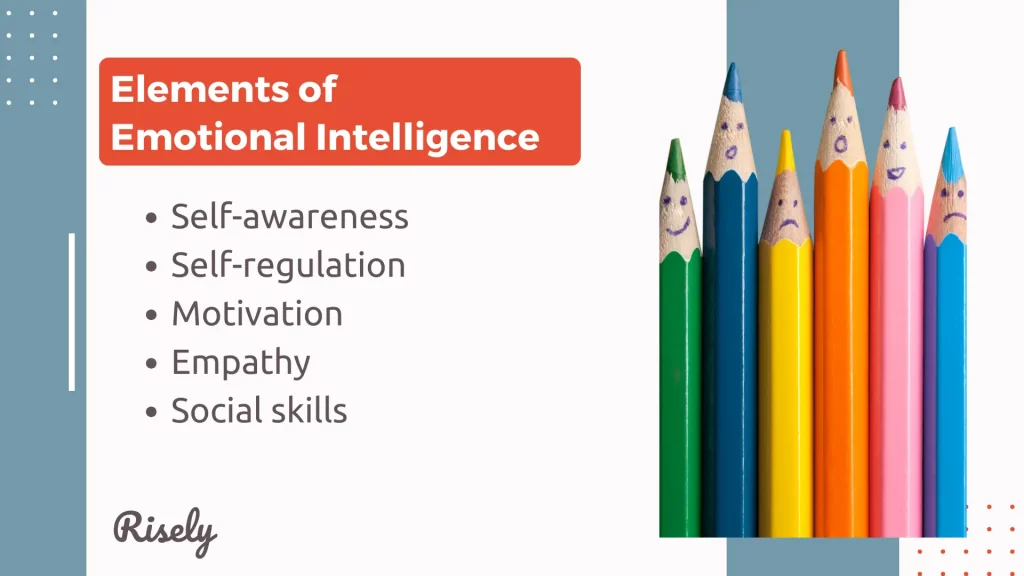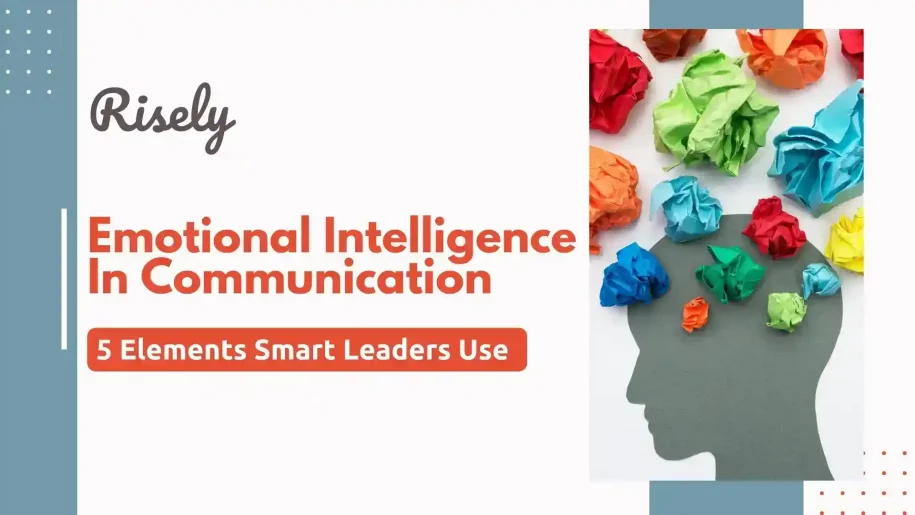Emotional Intelligence In Communication: 5 Elements Smart Leaders Use
Effective communication is the cornerstone of a thriving workplace. It doesn’t matter if you’re speaking to your team members, clients, or boss – articulating your thoughts and ideas clearly and concisely is crucial for success. But it’s not just about what you say but also how you say it. This is where emotional intelligence comes into play. Emotional intelligence in communication is all about being aware of your feelings and those of others and using that information to communicate better. This blog post will explore the importance of emotional intelligence in workplace communication and how it can help you excel at work. From enhanced listening skills to building positive relationships, we’ll cover five ways emotional intelligence can make a difference in your professional life. So let’s dive in and learn more about how emotional intelligence can benefit you at work.Emotional Intelligence in Communication: Where do the two meet?
Emotional intelligence is commonly understood as the ability to manage your and someone else’s emotions competently. It includes navigating situations where emotions may be on the highs and lows while ensuring no one is hurt. Daniel Goleman, the author of Emotional Intelligence, the seminal work on the issue, defines it as a person’s ability to manage feelings so that they are expressed appropriately and effectively. According to Goleman, emotional intelligence is the most significant single predictor of success in the workplace. You might also find interesting: IQ vs. EQ In The Workplace: 7 Tips to Balance the Two ForcesFive Aspects of Emotional Intelligence You Should Know
- Self-awareness: Emotional intelligence begins with taking charge of one’s own emotions. Thus, self-awareness forms the first element of emotional intelligence as it helps you get closer to yourself.
- Self-regulation: In the second aspect, emotional intelligence delves into controlling emotions in the area where we can do best – ourselves. Emotionally intelligent people process feelings carefully and avoid impulsive actions.
- Motivation: Motivation in the area of emotional intelligence talks about not giving up when setbacks come knocking. It involves being resilient in facing challenges and focusing on your goals.
- Empathy: Empathy calls for standing in someone else’s shoes. Understanding things how they see them – to help them process it better and to become a more sensitive guide in times of need.
- Social skills: Lastly, great emotional intelligence goes parallel with social skills. It includes building and maintaining positive relationships, effective communication, conflict resolution, and collaboration.

What is the Importance of Emotional Intelligence in Communication?
Effective communication is the core of maintaining positive relationships with colleagues and clients. Effective communication involves more than just exchanging words. It requires understanding and managing emotions, an essential aspect of emotional intelligence in communication. Professionals with high emotional intelligence can build better relationships, connect with others effectively, and work collaboratively in teams. It is among the strongest predictors of workplace performance (58%) as per studies by TalentSmart. Emotional intelligence in communication incorporates verbal and nonverbal cues, including tone of voice and body language, to convey messages accurately. By developing emotional intelligence in communication, you can improve job performance and become a more productive manager. Moreover, it enhances conflict resolution skills, allowing you to resolve issues amicably while preserving professional relationships. People with high emotional intelligence are more adept at handling stress and bouncing back from setbacks faster, contributing to a better work environment. By developing emotional intelligence in communication, you can improve your problem-solving abilities and boost leadership qualities, ultimately leading to enhanced team morale and increased productivity.Applying Emotional Intelligence in Communication at Work
Building Self-awareness
Self-awareness, in its simplest form, is knowing yourself. It is the ability to recognize and understand one’s own thoughts, feelings, and behaviors. It involves having insight into your own emotions, motivations, strengths, weaknesses, and the impact you have on others. What does this look like in action? Let’s visit two managers to understand better. Maria is a team manager. During a team project meeting, Maria noticed a shift in the atmosphere. Some team members seemed reluctant to share their ideas, and there was an undercurrent of tension. Instead of plowing ahead with the agenda, Maria paused the meeting and addressed the emotional tone in the room. Maria openly shared that she was feeling the pressure but emphasized the importance of open communication. In a similar project meeting, John faced a similar situation with tension among team members. However, John was not attuned to the emotional dynamics. He continued with the agenda without acknowledging the mood in the room. As the meeting progressed, the tension escalated, and team members became increasingly frustrated. John failed to recognize the impact of the project challenges on the team’s emotions and missed an opportunity to address and alleviate the stress. A self-aware person is attuned to their own mental and emotional state, allowing them to make more informed decisions, manage their reactions, and navigate social interactions effectively, as we saw in the examples above.Practicing Self-regulation
In the step next to self-awareness, we discover self-regulation. Self-regulation refers to the ability to manage and control one’s own emotions, impulses, and behaviors. It involves staying composed under pressure, resisting the urge for impulsive reactions, and adapting to challenging situations in a calm and collected manner. Developing self-regulation is a critical component of emotional intelligence, as it enables you to maintain composure, make rational choices, and positively influence interpersonal relationships. As we saw in the examples above, one of the managers, Maria, acknowledged that she was also feeling anxious. But while being vulnerable and connecting with her team members, she ensured that her fears and stress were not spread across the whole team. Instead, she directed them toward a solution. On the other hand, we saw the case of John, who could not recognize those emotions. John’s messaging to the team would signal that they must hide their feelings and keep following the routine, setting the scene for further stress and tension.Other Interesting Reads
Embodying Motivation
As the third critical area of emotionally intelligent communication, we have motivation. Motivation refers to the mindset which enables you to keep moving in the face of challenges. Being motivated means that emotionally provocative situations do not shift your focus away from your goals. Instead, you channel your emotions effectively to complement your motivation and keep moving toward success. Now, this may not be the easiest step for managers. Among the above two managers that we were talking about, John eventually realized the extent of the challenges that they were facing. A lot of missed deadlines would mean a significant delay on the project. His motivation was low as he could not see a way out amid all the stress and confusion. Team members began to feel the strain, and there was a noticeable decline in enthusiasm. John’s lack of proactive motivation and failure to communicate a shared vision contributed to a sense of disengagement among team members. On the other hand, in the case of an emotionally intelligent manager like Maria, we find something different. Maria ensures that negative feelings do not get back at her. Instead, she shared a vision of success, highlighting the team’s capabilities and the value of their contributions. This motivational talk re-energized the team, instilling a sense of purpose and commitment. Maria’s enthusiasm and belief in the team’s abilities were crucial in boosting motivation and ensuring everyone was aligned toward the common goal.Acting with Empathy
There has been one consistent marker of difference throughout the story of the two managers. What could that be? It’s empathy. When we meet Maria, we see her talking to her team with vulnerability and sharing her side of the story while embracing theirs. She regularly communicates and understands things from the perspectives of her team members. It allows her to solve their problems better by addressing bottlenecks. On the other hand, in John’s case, we often find a wall between the manager and the team, which is broken when the negative emotions overwhelm and overpower the entire team. The lack of understanding in this team limits their ability to communicate and share ideas in stressful situations, thus outlining the wide gap in empathy. Empathy is the ability to understand and share the feelings of another person. It involves stepping into someone else’s shoes, comprehending their perspective, and emotionally resonating with their experiences. Empathy goes beyond simple awareness of another person’s emotions; it encompasses a deeper understanding of those emotions and a genuine concern for the well-being of others. Read more: Practicing Empathetic Communication: 5 Secrets of Successful ManagersMastering Social skills
Empathy is in your mind. And you bring it to life with your actions. This is where your social skills come into play. Social skills refer to the ability to communicate, interact, and collaborate effectively with others in various social situations. People with strong social skills can navigate interpersonal relationships at work, work well in groups, and adapt their communication styles to different contexts. These skills are crucial in personal and professional settings, contributing to positive interactions and successful collaborations, as in the case of manager Maria. Emotional intelligence in communication is a complex but helpful skill for a manager to hone. As we witnessed, it can help managers overcome challenging team situations. Emotional intelligence and communication also combine to form a shield against challenges from the external side of things, like unpredictable changes and delays. Meanwhile, it empowers you to build the dream team that sticks with you through thick and thin. Check out a detailed blog on social intelligence for more insights: Social Intelligence: Building Strong Workplace Relationships as a LeaderEmotional Intelligence Communication Techniques: Lessons from Leaders
Now that we have understood what emotional intelligence in communication looks like let’s explore some emotional intelligence communication techniques with the help of some examples.Satya Nadella
The CEO of Microsoft is often commended for his empathetic and inclusive leadership style, emphasizing collaboration and fostering a positive work culture.
- Emphasizing Collaboration: Nadella’s emphasis on collaboration reflects emotional intelligence by recognizing the value of teamwork and collective effort. By doing so, he acknowledges the importance of diverse perspectives and encourages open communication among team members.
- Inclusive Leadership Style: Nadella’s inclusive leadership style demonstrates empathy by considering the needs and perspectives of a diverse workforce. This approach creates a sense of belonging among employees, promoting a positive and inclusive work culture.

Mary Barra
As the CEO of General Motors, Barra is recognized for her leadership during challenging times, emphasizing transparency, communication, and empathy with employees.
- Communicating Through Challenges: Barra’s leadership during challenging times reflects emotional intelligence by emphasizing transparency and communication. Being open about difficulties and challenges fosters trust among employees, showing empathy for their concerns and uncertainties.
- Emphasis on Empathy: She contributes to a more supportive and resilient organizational culture by acknowledging and addressing their concerns with empathy.

Howard Shultz
The former CEO of Starbucks is known for his focus on creating a company culture that values employees and customers, promoting social responsibility and ethical business practices.
- Creating a Positive Company Culture: Schultz’s focus recognizing the importance of a positive and values-driven culture contributes to employee satisfaction, loyalty, and overall business success.
- Promoting Social Responsibility: His commitment to social responsibility and ethical business practices reflects empathy for broader societal concerns. This approach aligns with emotional intelligence by acknowledging businesses’ impact on communities and the environment.

Conclusion
Emotional intelligence in communication is vital for success in the workplace. It enhances your ability to communicate effectively, build relationships, and display leadership qualities. With improved social skills and empathy, you can understand others better, build trust and respect, and create a positive work environment. In addition, emotional intelligence helps you respond appropriately to difficult situations and conflicts, leading to better outcomes. You can overcome personal biases and improve your communication skills by developing emotional awareness.Test your communication skills to get insights on blind spots holding you back.
Communication lies at the core of a manager’s success. Ensure you are not ignoring this core area by testing now.
FAQs
Is emotional intelligence part of communication?
Emotional intelligence is closely intertwined with communication, as it significantly influences how we understand, express, and respond to emotions during interpersonal interactions.
What is emotional intelligence in interpersonal communication?
Emotional intelligence in interpersonal communication refers to the ability to recognize and manage emotions, both within ourselves and in others, in order to enhance the quality of our communication and relationships.
What are the 5 elements of emotional intelligence?
The five elements of emotional intelligence, as proposed by Daniel Goleman, are:
– Self-awareness
– Self-regulation
– Motivation
– Empathy
– Social skills
– Self-awareness
– Self-regulation
– Motivation
– Empathy
– Social skills
Other Related Blogs
Handling Emotions at Work Effectively | Reiner Lomb
Handling Emotions at Work Effectively | Reiner Lomb Emotions are what make us human. But that’s also the part we try hard to hide in workplaces. Yet, healthy workplaces do…
Ennui: 7 out of 10 people on your team are bored
Ennui: 7 out of 10 people on your team are bored Over the past weekend, Inside Out 2 became the fastest animated film to cross the $1 billion mark. That’s…
IQ Vs EQ In The Workplace: How To Use Both Together
IQ Vs EQ In The Workplace: How To Use Both Together? When it comes to being an effective manager, what takes the lead – your head or your heart? For…
11 Transferable Skills Examples: Understand Why It Is Important With Example
11 Transferable Skills Examples: Understand Why It Is Important With Example Have you ever wondered what makes certain professionals shine, effortlessly transitioning from one role to another? The secret lies…


